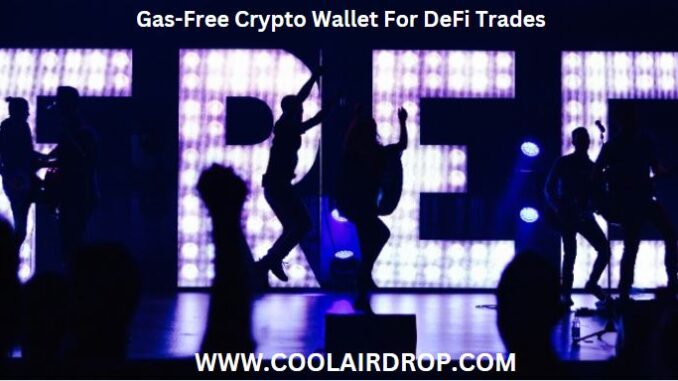
Gas-Free Crypto Wallet For DeFi Trades: The world of decentralized finance (DeFi) has opened up incredible opportunities for cryptocurrency traders and investors.
However, high gas fees on networks like Ethereum have made DeFi trades prohibitively expensive. This is where HOT Protocol steps in—a revolutionary solution offering a gas-free crypto wallet for effortless DeFi transactions.
HOT Protocol combines Multi-Party Computation (MPC) technology and cross-chain capabilities to redefine the DeFi trading experience.
Here’s why HOT Protocol is the best choice:
- Gas-Free Swaps: Trade omni tokens across multiple chains with no fees.
- Cross-Chain Bridging: Transfer assets in under 30 seconds.
- Advanced Security: MPC wallets with 2FA options ensure your assets remain safe.
- Omni Tokens: Unified balances across chains for efficient trading.
Let’s explore the details behind this innovative gas-free solution.
Which Wallet Is Best for DeFi?
The best wallet for DeFi should offer security, usability, and affordability. HOT Protocol’s wallet is an excellent option because:
- Decentralized Key Management: It uses MPC technology to secure your private keys.
- Cross-Chain Compatibility: Seamlessly interact with multiple blockchains.
- Gas-Free Transactions: Avoid the high gas fees common on Ethereum.
Unlike other wallets, HOT Protocol focuses on creating a seamless and affordable DeFi trading experience.
Which Crypto Wallet Has No Gas Fee?
HOT Protocol’s wallet is among the few that enable gas-free transactions. By utilizing omni tokens, users can deposit, withdraw, and trade assets across chains without incurring gas fees. This feature is particularly beneficial for traders looking to optimize costs in DeFi.
Ready to experience gas-free trades? Try HOT Wallet today.
Which Crypto Has No Gas Fees?
While most cryptocurrencies incur gas fees, HOT Protocol has introduced omni tokens, which allow for gas-free transactions across chains. These tokens simplify DeFi trading by eliminating hidden costs and ensuring affordability.
Features of omni tokens:
- Unified Balances: Manage assets from multiple blockchains in one place.
- Zero Gas Fees: Reduce costs without compromising transaction speed.
- Instant Swaps: Trade across chains in seconds.
Switch to HOT Protocol and trade smarter with omni tokens.
Which Blockchain Has Zero Gas Fees?
Several blockchains aim to reduce or eliminate gas fees, but they often come with trade-offs in decentralization or functionality.
HOT Protocol’s innovative approach enables gas-free transactions by leveraging omni tokens and cross-chain compatibility.
While blockchains like Solana and Avalanche offer lower fees, HOT Protocol’s solution goes further by removing them entirely for supported transactions.
Learn more about this game-changing technology at HOT Protocol.
Which Network Has No Gas Fee?
HOT Protocol creates an independent network where gas fees are no longer a barrier. By using omni tokens and cross-chain technology, users can:
- Avoid Network Congestion: Bypass delays and high costs on busy blockchains.
- Trade Freely: Focus on trading instead of calculating fees.
- Experience Seamless Transfers: Move assets across chains without incurring costs.
Start using a network designed for efficiency and affordability at HOT Protocol.
What Is the Cheapest Gas Fee Blockchain?
While Ethereum often has high gas fees, blockchains like Polygon and Binance Smart Chain (BSC) offer cheaper alternatives. However, HOT Protocol eliminates gas fees altogether for supported transactions, making it the most cost-effective solution for DeFi enthusiasts.
Why settle for low fees when you can have zero fees? Explore HOT Protocol now.
How Do I Avoid Ethereum Gas Fees?
Ethereum gas fees can be unpredictable and expensive, especially during peak network activity. Here’s how to avoid them:
- Use Cross-Chain Solutions: HOT Protocol allows you to trade omni tokens without gas fees.
- Switch to Layer 2 Networks: While Layer 2 solutions reduce fees, they still involve some costs.
- Optimize Transaction Times: Send transactions during off-peak hours.
HOT Protocol offers the most straightforward solution with its gas-free wallet. Learn more here.
What Is the Gas Fee for USDT?
Gas fees for transferring USDT vary depending on the blockchain:
- Ethereum: High fees due to network congestion.
- Tron: Typically lower fees but still incurs costs.
- HOT Protocol: Zero fees when using omni tokens.
Avoid unnecessary expenses by switching to HOT Wallet for USDT transactions.
What Is the Cheapest Blockchain Fee?
The cheapest blockchain fees are typically found on newer, more scalable networks like:
- Polygon: Low-cost transactions with fast confirmation times.
- Solana: Minimal fees for high-speed transactions.
- Binance Smart Chain (BSC): Affordable but centralized.
However, HOT Protocol goes a step further by eliminating fees for supported transactions using omni tokens. Why pay fees when you don’t have to? Learn more.
Gas-Free Crypto Wallet For DeFi Trades
Why HOT Protocol Is the Ultimate Solution
HOT Protocol revolutionizes crypto wallets with its focus on affordability, security, and usability. Key features include:
- Gas-Free Swaps: Avoid high fees and trade efficiently.
- MPC Technology: Secure key management ensures peace of mind.
- Cross-Chain Bridging: Move assets across chains effortlessly.
- Omni Tokens: Unified balances for seamless asset management.
Take control of your DeFi trades with the best gas-free wallet. Start using HOT Protocol today.
Conclusion
Gas fees have long been a hurdle for DeFi traders, but HOT Protocol changes the game. With its gas-free wallet, advanced MPC technology, and cross-chain capabilities, it’s the ultimate solution for anyone looking to optimize their crypto journey.
Don’t let gas fees hold you back. Join the future of DeFi with HOT Protocol now!

Leave a Reply